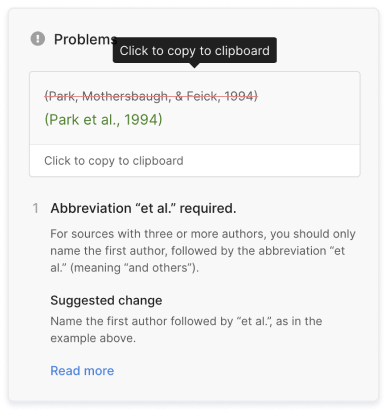Citing a Website in APA Style (6th Edition) | Format & Examples
APA website citations usually include the author, the publication date, the title of the page or article, and the URL. If there is no author, start the citation with the title of the article. If the page is likely to change over time, add a retrieval date.
If you are citing an online version of a print publication (e.g. a newspaper, magazine, or dictionary), use the same format as you would for print, with a URL added at the end.
Use the buttons below to explore the format.
Generate accurate APA citations with Scribbr
Citing an entire website
When you refer to a website in your text without quoting or paraphrasing from a specific part of it, you don’t need a formal citation. Instead, you can just include the URL in parentheses after the name of the site:
One of the most popular social media sites, Instagram (http://instagram.com), allows users to share images and videos.
For this kind of citation, you don’t need to include the website on the reference page. However, if you’re citing a specific page or article from a website, you will need a formal in-text citation and reference list entry.
How to cite online articles
Various kinds of articles appear online, and how you cite them depends on where the article appears.
Articles from online versions of newspapers and magazines
Articles appearing in online versions of print publications (e.g. newspapers and magazines) are cited like their print versions, but with an added URL. Give the homepage URL instead of the specific article, as the latter is more likely to change over time.
MacGillis, A. (2019, November 11). The case against Boeing. The New Yorker. Retrieved from https://www.newyorker.com/
Articles from blogs
Citations of blogs include the words “Blog post” and the article URL. The name of the blog is not included:
Other online articles
For articles from other websites, including news sites without print equivalents (e.g. BBC News, Reuters), the name of the site is not mentioned, and the URL links directly to the article:
Websites with no author
When a web page does not list any author, replace the author name with the title of the page or article.
In the APA 6 in-text citation, put the title in quotation marks, and shorten it to the first few words if necessary.
| Format | Article Title. (Year, month day). Retrieved from URL |
| Example | Australia fires: ‘Catastrophic’ alerts in South Australia and Victoria. (2019, November 11). Retrieved from https://www.bbc.com/news/world-australia-50483410 |
| In-text citation | (“Australia fires,” 2019) |
Note that if the source is attributed to a specific organization or company, you should use this as the author name instead.
Websites with no date
When a web page or article does not list a publication or revision date, replace the date with “n.d.” (“no date”) in all citations.
If an online source is likely to change over time, it is recommended to include the date on which you accessed it.
| Format | Author or Organization Name. (n.d.). Article Title. Retrieved month day, year, from URL |
| Reference list | University of Amsterdam. (n.d.). About the UvA. Retrieved November 20, 2019, from https://www.uva.nl/en/about-the-uva/about-the-university/about-the-university.html |
| In-text citation | (University of Amsterdam, n.d.) |
How to cite from social media
7th edition updates
Since the 6th edition of the APA manual does not provide guidelines for citing from social media, the information in this section follows the 7th edition.
As social media posts are usually untitled, use the first 20 words of the post, in italics, as a title. Also include any relevant information about the type of post and any multimedia aspects (e.g. videos, images, sound) in square brackets:
On some social media sites, users go by usernames instead of or in addition to their real names. Where the author’s real name is known, include it, along with their username in square brackets:
In some cases, you’ll want to cite a whole social media profile instead of a specific post. In these cases, include an access date, because a profile will obviously change over time:
Dorsey, J. [@jack]. (n.d.). Tweets [Twitter profile]. Twitter. Retrieved November 14, 2019, from https://twitter.com/jack
Sources in this article
We strongly encourage students to use sources in their work. You can cite our article (APA Style) or take a deep dive into the articles below.
This Scribbr articleCaulfield, J. (June 16, 2022). Citing a Website in APA Style (6th Edition) | Format & Examples. Scribbr. Retrieved October 17, 2022, from https://www.scribbr.com/apa-style/6th-edition/archived-cite-a-website/



